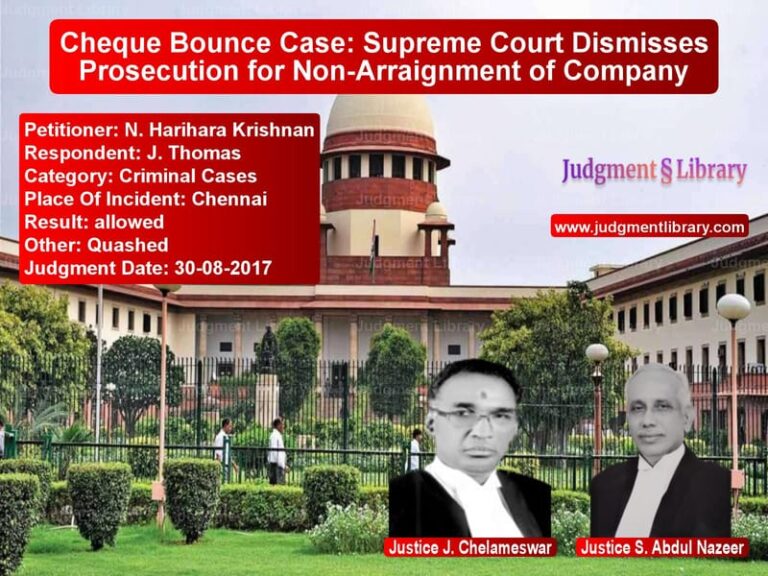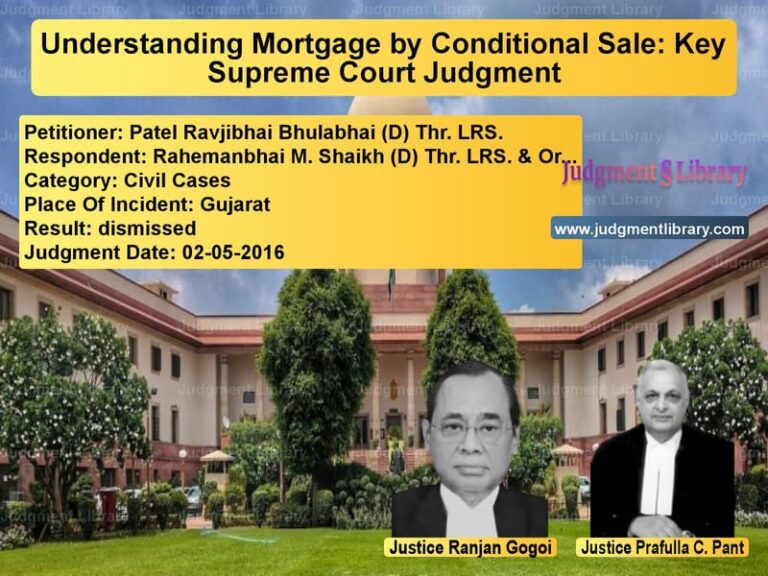Supreme Court Quashes Dowry Harassment Case Against Woman Not Related to Husband
The Supreme Court of India has quashed criminal proceedings against Dechamma I.M. @ Dechamma Koushik, who was accused under Section 498A of the Indian Penal Code (IPC) and the Dowry Prohibition Act, 1961. The Court ruled that a woman with whom the husband had a prior relationship does not fall under the definition of a ‘relative’ under Section 498A IPC and cannot be prosecuted under the provision.
Background of the Case
The case originated from an FIR lodged by Respondent No. 2 (the complainant) on April 19, 2019, against her husband, Adishetty, and several others, including the appellant, Dechamma I.M. The allegations included:
- Physical and mental harassment by the husband and his relatives.
- Continued relationship between her husband and the appellant, which allegedly caused discord in the marriage.
- Verbal abuse by the appellant via phone calls.
Based on the complaint, the police registered Crime No. 339 of 2019 at the Gundlupete Police Station, Karnataka, under the following sections:
- Section 498A IPC: Cruelty by husband or his relatives.
- Section 504 IPC: Intentional insult with intent to provoke breach of peace.
- Section 109 IPC: Abetment of an offense.
- Sections 3 and 4 of the Dowry Prohibition Act: Prohibition of giving or taking dowry.
High Court’s Ruling
After a charge sheet was filed against the accused, the appellant, Dechamma I.M., approached the Karnataka High Court under Section 482 of the Code of Criminal Procedure (CrPC), seeking to quash the proceedings. She argued:
- The allegations were false and frivolous.
- She lived 200 km away and had no role in the complainant’s marital discord.
- She was not a relative of the husband and could not be prosecuted under Section 498A IPC.
The High Court, however, dismissed her plea, stating that the case should go to trial for a full examination of the evidence.
Supreme Court’s Examination
The appellant then approached the Supreme Court, where Justices B.R. Gavai and K.V. Viswanathan considered two critical legal questions:
1. Can a Woman in a Pre-Marital Relationship with the Husband Be Prosecuted Under Section 498A?
The Court relied on its earlier judgment in U. Suvetha v. State (2009), which clarified that a woman in a romantic or sexual relationship with the husband is not a ‘relative’ for the purpose of Section 498A IPC.
“By no stretch of imagination would a girlfriend or even a concubine in an etymological sense be a ‘relative.’ The word ‘relative’ brings within its purview a status conferred either by blood, marriage, or adoption.”
Applying this reasoning, the Supreme Court held that since the appellant was not related to the husband by marriage, blood, or adoption, she could not be prosecuted under Section 498A.
2. Does the Complaint Show a Dowry Demand?
The Court noted that for a case under Section 498A IPC to proceed, there must be clear evidence linking the alleged harassment to a demand for dowry. However, in this case, the allegations against the appellant did not involve dowry demands.
“Taking the allegations at their face value in the FIR or even in the charge sheet, there is no material to show that the appellant was in any way concerned with causing harassment to respondent No.2 on account of non-fulfillment of demand of dowry.”
Final Judgment
The Supreme Court ruled:
- The appeal was allowed.
- The Karnataka High Court’s order of April 12, 2021, was quashed.
- All criminal proceedings against the appellant in Crime No. 339 of 2019 were quashed.
Implications of the Judgment
This ruling has significant implications for cases involving allegations under Section 498A IPC and the Dowry Prohibition Act:
1. Clarification on Who Can Be Prosecuted Under Section 498A IPC
The judgment reinforces that only individuals legally related to the husband can be prosecuted under Section 498A.
2. Protection Against Misuse of Dowry Laws
The ruling prevents the wrongful prosecution of third parties who are not part of the marital relationship.
3. Strengthening the Right to Fair Trial
The case underscores that courts must quash cases where allegations do not meet the essential legal criteria.
Conclusion
The Supreme Court’s decision in Dechamma I.M. vs. State of Karnataka upholds the principle that Section 498A IPC applies only to legally recognized relatives. By quashing the FIR and charge sheet, the Court reinforced the importance of fair legal proceedings and protection against misuse of dowry laws. This case serves as a significant precedent in ensuring that criminal law is not misused to target individuals who have no legal liability.
Petitioner Name: Dechamma I.M. @ Dechamma Koushik.Respondent Name: State of Karnataka.Judgment By: Justice B.R. Gavai, Justice K.V. Viswanathan.Place Of Incident: Gundlupete, Karnataka.Judgment Date: 04-12-2024.
Don’t miss out on the full details! Download the complete judgment in PDF format below and gain valuable insights instantly!
Download Judgment: dechamma-i.m.-@-dech-vs-state-of-karnataka-supreme-court-of-india-judgment-dated-04-12-2024.pdf
Directly Download Judgment: Directly download this Judgment
See all petitions in Dowry Cases
See all petitions in Bail and Anticipatory Bail
See all petitions in Criminal Defamation
See all petitions in Judgment by B R Gavai
See all petitions in Judgment by K.V. Viswanathan
See all petitions in allowed
See all petitions in Quashed
See all petitions in supreme court of India judgments December 2024
See all petitions in 2024 judgments
See all posts in Criminal Cases Category
See all allowed petitions in Criminal Cases Category
See all Dismissed petitions in Criminal Cases Category
See all partially allowed petitions in Criminal Cases Category







